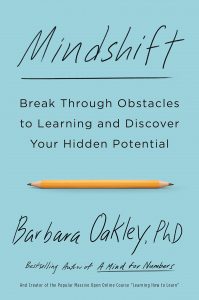My idol Betty White once said, “Don’t try to be young. Just open your mind. Stay interested in stuff. There are so many things I won’t live long enough to find out about, but I’m still curious about them. You know people who are already saying, ‘I’m going to be 30—oh, what am I going to do?’ Well, use that decade! Use them all!”
 Well, Betty is 97, and I think she’s on to something. Learning doesn’t stop at graduation, nor should it.
Well, Betty is 97, and I think she’s on to something. Learning doesn’t stop at graduation, nor should it.
Why does it matter? There are practical reasons, such as staying relevant in one’s current career, preparing for a switch, or even returning to the workforce after retirement. Then there are reasons that might not be as obvious, such as staving off boredom, keeping the mind active and keeping you socially engaged. There are also scientific reasons: Research shows that continually learning slows memory decline and can help protect against Alzheimer’s disease and dementia.
Sometimes, we need a little inspiration to feel motivated to try something new, such as making a concerted effort to continue one’s education at the school of life. Of course, your library can help with that. After all, “lifelong learning” is our mission. Literally. We have free classes and events for all ages, all year long, as well as online classes and resources including language learning, computer skills, business courses, and more. Our Kanopy streaming service now offers the Great Courses series, so you can become an expert on a number of topics in no time at all.
Here are some books I recommend to inspire and motivate you to keep learning and protect that precious brain:
Atomic Habits by James Clear: Just the tiniest (atom-sized) habits lead to powerful results if you just stick with them over the long term. This hands-on practical guide presents usable techniques to build good habits and reduce the bad ones.
Presence by Amy Cuddy: Social psychologist and TED speaker Cuddy presents simple techniques to enhance your presence, which she defines as a confident physical presentation that boosts mental confidence, and allows us to rise to challenges without anxiety or second-guessing ourselves.
Flow by Mihaly Csikszentmihalyi: In this modern classic, psychologist Csikszentmihalyi demonstrates that the key to happiness is to be in a state of flow, in which we experience deep enjoyment, creativity, and engagement with life. We can learn to induce a state of flow by controlling the information that enters our consciousness, greatly improving the quality of our lives.
The Warrior Code by Tee Marie Hanible: Drawing on her rise from adversity, reality star and retired Marine Gunnery Sgt. Hanible serves up 11 principles to unleash your innate strength and realize your true potential.
Rise and Grind by Daymond John: Starting with a $40 budget, John’s FUBU clothing line has generated over $6 billion in sales, illustrating the point that you have to out-think, out-hustle, and out-perform everyone around you. John takes a close look at the routines and winning secrets of individuals who have risen to the top of their fields through grit, persistence and hard work.
Curious by Ian Leslie: We are all born curious, but why does curiosity decline? Journalist Leslie discusses the history and stages of curiosity and how online search engines have made us less curious, to society’s detriment. He examines visionaries from over the centuries and how they became successful: not by luck, but by the need for information. The key to success, then, is to stay hungry for information.
Mindshift by Barbara A Oakley: Drawing on the latest neuroscientific insights, Oakley shows us how we can uncover and develop talents we didn’t realize we had, no matter our age or background. The ideas of “aptitude” and “ability” only provide a snapshot of who we are now without considering how we can change. Even seemingly negative traits, such as poor memory, come with hidden advantages. Oakley shows us how we can turn perceived weaknesses, such as impostor syndrome and advancing age, into strengths by adopting a learning lifestyle.
The Intelligence Trap by David G. Robson: Being smart doesn’t necessarily lead to good decisions. So Robson offers a toolkit for overcoming the components of flawed thinking such as bias blind spots and earned dogmatism. These tools include moral algebra, self-reflection, and the ability to recognize lies and information. Added bonus: acquiring evidence-based wisdom improves memory (and combats the dreaded spread of fake news).
For more online learning available at no charge with your Central Rappahannock Regional Library card, visit librarypoint.org/research.
Tracy McPeck is the adult services coordinator at Central Rappahannock Regional Library. This column first appeared in the Free Lance-Star newspaper.

